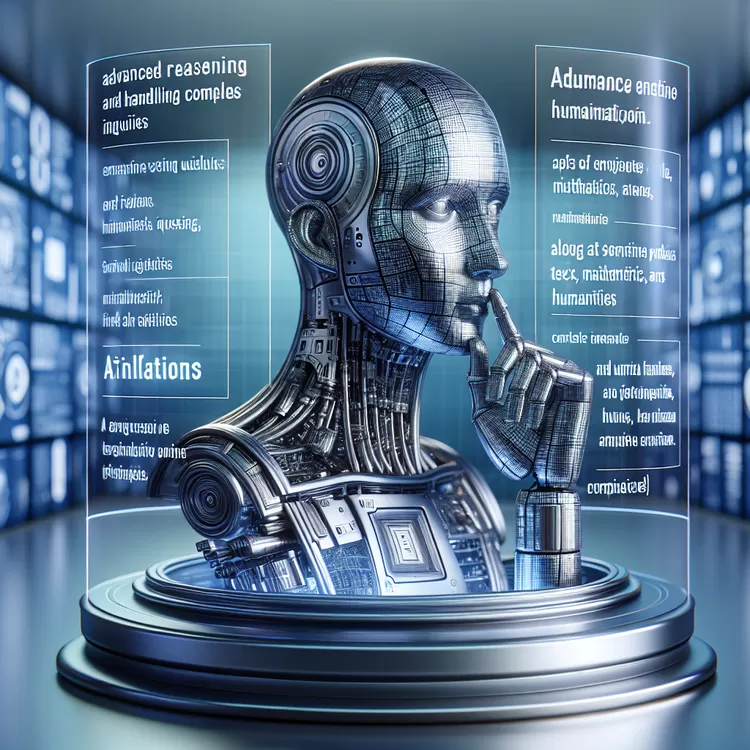Google has unveiled a new artificial intelligence (AI) model called Gemini, which the company claims has advanced reasoning capabilities and can “think more carefully” when answering difficult questions. This is significant because AI content generators have been known to sometimes create false information, a phenomenon referred to as hallucinations. Gemini has been tested in various subject areas, including mathematics and humanities, to assess its problem-solving and knowledge abilities. Sundar Pichai, the CEO of Google, believes that Gemini represents a new era for AI.
Google approached the launch of its AI chatbot, Bard, earlier this year with caution, describing it as an experiment. Bard made a mistake during its publicity demo by providing an incorrect answer to a question about space. However, Google is confident in the capabilities of its new model, claiming that it is the most capable one yet and can outperform human experts in various intelligence tests. Gemini has the ability to recognize and generate text, images, and audio, but it is not a standalone product. Instead, it will be integrated into Google’s existing tools, including search and Bard.
Gemini has set a new standard by demonstrating its ability to learn from sources other than text, such as pictures. This feature has the potential to enable innovations that could transform generative AI, according to Chirag Dekate, an analyst from Gartner. While Google’s Gemini outperforms OpenAI’s platform GPT-4 on 30 out of 32 widely-used academic benchmarks, OpenAI is set to release a more powerful version of its software next year. The competition in the AI field is also growing, with Elon Musk’s xAI seeking to raise funds for research and development, and Chinese firm Baidu making advancements in its own AI products.
As AI technology continues to evolve rapidly, concerns about its potential to cause harm are also increasing. Governments worldwide are working on developing rules and legislation to address the future risks of AI. In November, a summit in the UK discussed the subject, resulting in a declaration calling for the safe development of AI. It is crucial to address these potential dangers with a sense of urgency, unity, and collective strength, as emphasized by The King.
Original news source: Google claims new Gemini AI ‘thinks more carefully’ (BBC)
Listen:
Slow
Normal
Fast
Group or Classroom Activities
Warm-up Activities:
– News Summary
Instructions: In pairs, students will read the article and then summarize the main points in their own words. They can take turns sharing their summaries with the class.
– Opinion Poll
Instructions: Divide the class into small groups. Each group will come up with a question related to AI technology and its potential risks. They will then conduct an opinion poll within the class, asking their classmates for their opinions on the topic. After gathering the data, each group will present their findings to the class.
– Sketch It
Instructions: Provide each student with a piece of paper and a pencil. In pairs, students will take turns describing a scene or concept related to AI technology, while their partner tries to sketch it based on their description. Afterward, students will compare their sketches and discuss any differences or similarities.
– Keyword Taboo
Instructions: Write down a list of keywords related to the article on separate index cards. Divide the class into two teams. One player from each team will come to the front of the class. The teacher will show them a keyword from the article, and they must try to describe it to their team without using the keyword itself. The team that guesses correctly gets a point, and the game continues with new players and keywords.
– Think-Pair-Share
Instructions: In pairs, students will have a few minutes to think about and write down their thoughts on the following question: “What are your thoughts on the future of AI technology?” Afterward, they will share their ideas with their partner and engage in a discussion. Finally, a few pairs will share their thoughts with the whole class.
Comprehension Questions:
1. What is the name of Google’s new AI model?
2. How has Gemini been tested to assess its abilities?
3. How did Google describe its AI chatbot, Bard, during its launch?
4. What mistake did Bard make during its publicity demo?
5. What can Gemini recognize and generate?
6. According to Chirag Dekate, what potential does Gemini’s ability to learn from sources other than text have?
7. How does Gemini compare to OpenAI’s platform GPT-4 on academic benchmarks?
8. What concerns are increasing as AI technology evolves rapidly?
Go to answers ⇩
Listen and Fill in the Gaps:
(1)______ has unveiled a new artificial intelligence (AI) (2)______ called Gemini, which the company claims has advanced reasoning capabilities and can “think more carefully” when (3)______ difficult (4)______. This is significant because AI content generators have been known to sometimes create false information, a phenomenon referred to as hallucinations. Gemini has been tested in various subject areas, including mathematics and humanities, to assess its problem-solving and knowledge abilities. Sundar Pichai, the CEO of Google, believes that Gemini represents a new era for AI.
Google approached the launch of its AI chatbot, Bard, earlier this year with caution, describing it as an experiment. Bard made a mistake during its publicity demo by providing an incorrect answer to a question about space. However, Google is confident in the (5)______ of its new model, claiming that it is the most (6)______ one yet and can outperform human experts in various intelligence tests. Gemini has the ability to recognize and (7)______ text, images, and (8)______, but it is not a standalone product. Instead, it will be integrated into Google’s existing tools, including search and Bard.
Gemini has set a new (9)______ by demonstrating its ability to (10)______ from sources other than text, such as pictures. This feature has the potential to enable innovations that could transform (11)______ AI, according to Chirag Dekate, an analyst from Gartner. While Google’s Gemini outperforms (12)______’s platform GPT-4 on 30 out of 32 widely-used academic benchmarks, OpenAI is set to release a more powerful version of its software next year. The competition in the AI field is also growing, with Elon Musk’s xAI seeking to raise funds for research and development, and Chinese firm Baidu (13)______ advancements in its own AI products.
As AI technology (14)______ to evolve rapidly, concerns about its potential to cause harm are also increasing. Governments worldwide are working on developing rules and legislation to (15)______ the (16)______ risks of AI. In November, a summit in the UK discussed the subject, resulting in a declaration calling for the safe development of AI. It is crucial to address these potential dangers with a sense of urgency, unity, and collective strength, as emphasized by The King.
Go to answers ⇩
Discussion Questions:
Students can ask a partner these questions, or discuss them as a group.
1. What is your opinion on the advancements in artificial intelligence, such as Google’s Gemini?
2. How would you feel if AI technology like Gemini became more advanced than human experts in various fields?
3. Do you think it is possible for AI to completely replace human experts? Why or why not?
4. What potential dangers do you see in the rapid evolution of AI technology?
5. How do you think governments should address the future risks of AI?
6. Do you believe there should be strict regulations and legislation in place for the development of AI? Why or why not?
7. Have you ever had an experience where AI technology provided false information? How did it affect your perception of AI?
8. What are some potential benefits of AI technology like Gemini being integrated into existing tools like search engines?
9. How do you think AI technology can transform generative AI, as mentioned by Chirag Dekate?
10. Do you think AI technology will continue to advance at a rapid pace? Why or why not?
11. What role do you think AI technology will play in the future of education and learning?
12. How do you think AI technology like Gemini can be used to benefit society as a whole?
13. Have you ever used AI technology in your daily life? How has it made your life easier or more convenient?
14. How do you think AI technology will impact job opportunities and the workforce in the future?
15. Do you think it is necessary for individuals to have a basic understanding of AI technology? Why or why not?
Individual Activities
Multiple Choice Questions:
1. What is the name of Google’s new AI model?
(a) Gemini
(b) Bard
(c) GPT-4
(d) xAI
2. What is the phenomenon referred to as when AI content generators create false information?
(a) Reasoning
(b) Hallucinations
(c) Problem-solving
(d) Knowledge abilities
3. How did Google describe its AI chatbot, Bard, when it was launched earlier this year?
(a) Most capable one yet
(b) Standalone product
(c) Caution
(d) Experiment
4. What mistake did Bard make during its publicity demo?
(a) Provided an incorrect answer to a question about space
(b) Failed to generate text, images, and audio
(c) Outperformed human experts in intelligence tests
(d) Integrated into Google’s existing tools
5. According to Chirag Dekate, what potential does Gemini have to transform generative AI?
(a) Outperforms OpenAI’s platform GPT-4 on academic benchmarks
(b) Integration into Google’s existing tools
(c) Ability to learn from sources other than text, such as pictures
(d) Advancements in AI products by Chinese firm Baidu
6. How many academic benchmarks does Gemini outperform OpenAI’s platform GPT-4 on?
(a) 32 out of 32
(b) 2 out of 32
(c) 0 out of 32
(d) 30 out of 32
7. What is Elon Musk’s AI firm called?
(a) Gemini
(b) Bard
(c) xAI
(d) GPT-4
8. What is the main concern as AI technology continues to evolve rapidly?
(a) Integration into Google’s existing tools
(b) Potential to cause harm
(c) Advancements in AI products by Chinese firm Baidu
(d) Safe development of AI
True or False Questions:
1. Gemini will not be integrated into Google’s existing tools, including search and Bard.
2. OpenAI is not set to release a more powerful version of its software next year, competing with Google’s Gemini.
3. Google’s previous AI chatbot, Bard, made a mistake during a demo by providing an incorrect answer.
4. Sundar Pichai, the CEO of Google, does not believe that Gemini represents a new era for AI.
5. Gemini can recognize and generate text, images, and audio.
6. Gemini has the ability to learn from sources other than text, such as pictures.
7. Gemini has been tested in various subject areas to assess its problem-solving and knowledge abilities.
8. Google has not developed a new AI model called Gemini that has advanced reasoning capabilities.
Go to answers ⇩
Write a Summary:
Write a summary of this news article in two sentences.
Writing Questions:
Answer the following questions. Write as much as you can for each answer.
1. What is Google’s new artificial intelligence model called and what is its main feature?
2. How did Google approach the launch of its AI chatbot Bard and what mistake did it make?
3. How does Gemini set a new standard in AI technology?
4. How does Google’s Gemini compare to OpenAI’s platform GPT-4?
5. What concerns are arising as AI technology continues to evolve and what actions are governments taking to address these concerns?
Answers
Comprehension Question Answers:
1. What is the name of Google’s new AI model?
Gemini
2. How has Gemini been tested to assess its abilities?
Gemini has been tested in various subject areas, including mathematics and humanities, to assess its problem-solving and knowledge abilities.
3. How did Google describe its AI chatbot, Bard, during its launch?
Google described Bard as an experiment.
4. What mistake did Bard make during its publicity demo?
Bard provided an incorrect answer to a question about space during its publicity demo.
5. What can Gemini recognize and generate?
Gemini can recognize and generate text, images, and audio.
6. According to Chirag Dekate, what potential does Gemini’s ability to learn from sources other than text have?
According to Chirag Dekate, Gemini’s ability to learn from sources other than text has the potential to enable innovations that could transform generative AI.
7. How does Gemini compare to OpenAI’s platform GPT-4 on academic benchmarks?
Gemini outperforms OpenAI’s platform GPT-4 on 30 out of 32 widely-used academic benchmarks.
8. What concerns are increasing as AI technology evolves rapidly?
Concerns about the potential harm caused by AI technology are increasing.
Go back to questions ⇧
Listen and Fill in the Gaps Answers:
(1) Google
(2) model
(3) answering
(4) questions
(5) capabilities
(6) capable
(7) generate
(8) audio
(9) standard
(10) learn
(11) generative
(12) OpenAI
(13) making
(14) continues
(15) address
(16) future
Go back to questions ⇧
Multiple Choice Answers:
1. What is the name of Google’s new AI model?
Answer: (a) Gemini
2. What is the phenomenon referred to as when AI content generators create false information?
Answer: (b) Hallucinations
3. How did Google describe its AI chatbot, Bard, when it was launched earlier this year?
Answer: (d) Experiment
4. What mistake did Bard make during its publicity demo?
Answer: (a) Provided an incorrect answer to a question about space
5. According to Chirag Dekate, what potential does Gemini have to transform generative AI?
Answer: (c) Ability to learn from sources other than text, such as pictures
6. How many academic benchmarks does Gemini outperform OpenAI’s platform GPT-4 on?
Answer: (d) 30 out of 32
7. What is Elon Musk’s AI firm called?
Answer: (c) xAI
8. What is the main concern as AI technology continues to evolve rapidly?
Answer: (b) Potential to cause harm
Go back to questions ⇧
True or False Answers:
1. Gemini will not be integrated into Google’s existing tools, including search and Bard. (Answer: False)
2. OpenAI is not set to release a more powerful version of its software next year, competing with Google’s Gemini. (Answer: False)
3. Google’s previous AI chatbot, Bard, made a mistake during a demo by providing an incorrect answer. (Answer: True)
4. Sundar Pichai, the CEO of Google, does not believe that Gemini represents a new era for AI. (Answer: False)
5. Gemini can recognize and generate text, images, and audio. (Answer: True)
6. Gemini has the ability to learn from sources other than text, such as pictures. (Answer: True)
7. Gemini has been tested in various subject areas to assess its problem-solving and knowledge abilities. (Answer: True)
8. Google has not developed a new AI model called Gemini that has advanced reasoning capabilities. (Answer: False)
Go back to questions ⇧















